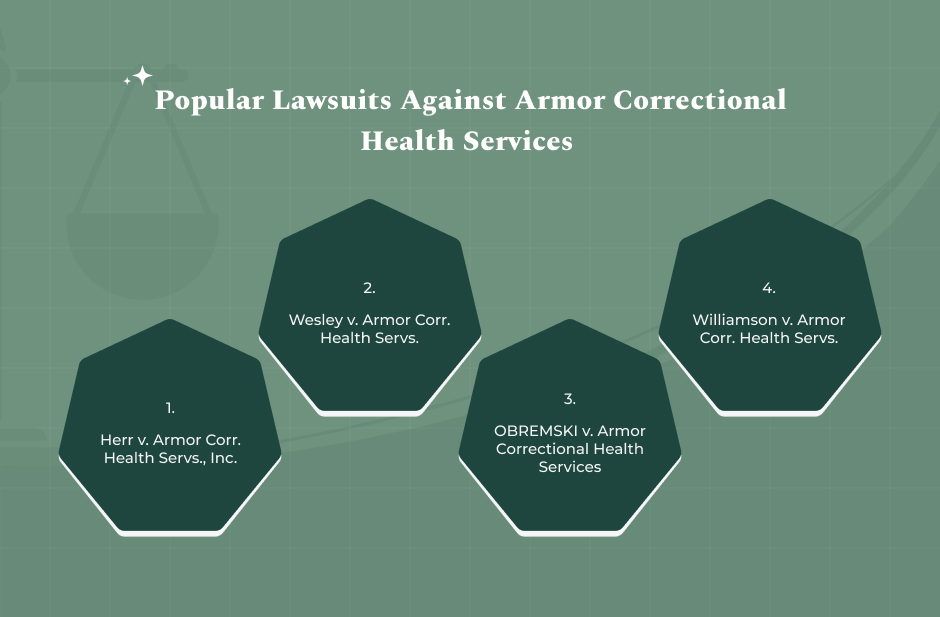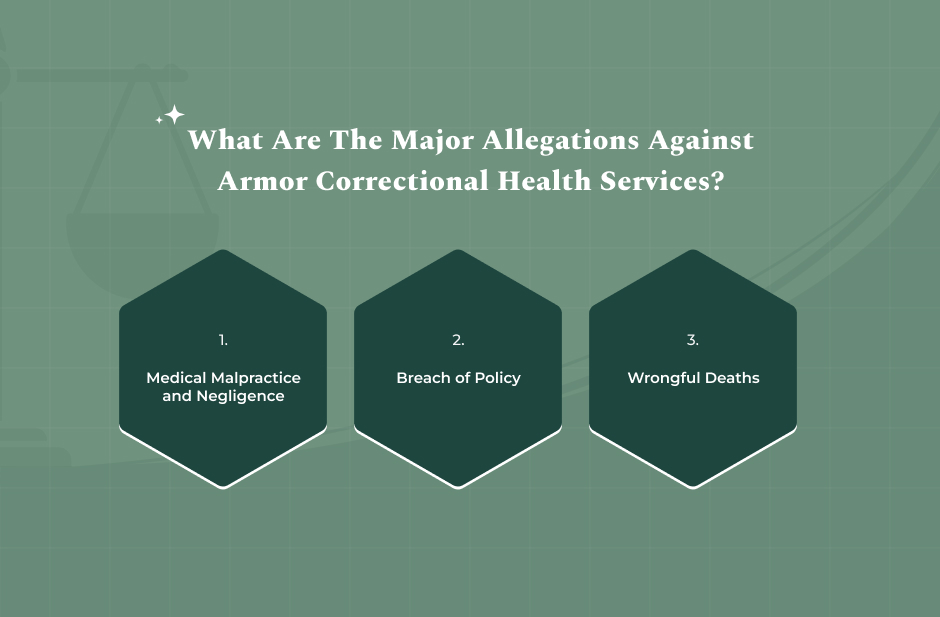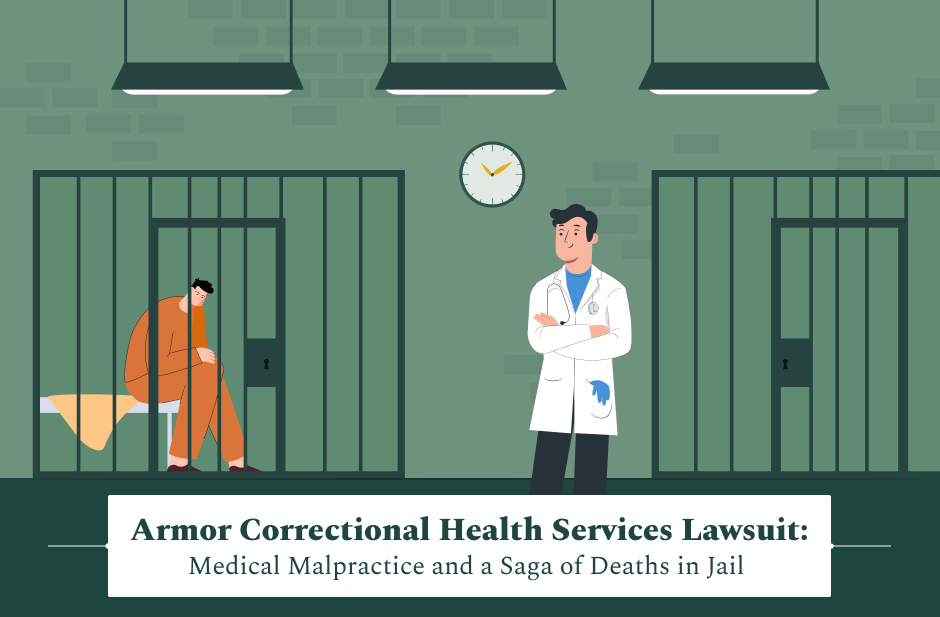Sick people go to jail. Sick people die. This is the basic story behind the most controversial tort case, the Armor Correctional Health Services lawsuit.
But is it really that simple? Absolutely not.
The case, which dates back to 2016, concerns a health service company that provides medical services to prisoners and law offenders in state and local correctional facilities in the United States.
People came together against the company when inmates started dying one by one. I know it sounds really weird, but it is what it is.
However, what’s weirder is that the company has apparently faced more than 500 cases since its inception. So, what is all this about? And what do you need to know if you face a situation like this?
In this article, I will talk about the following things:
- What is Armor Correctional Health Services?
- Legal framework and standard of care with health services.
- Overview of the Armor Correctional Health Services lawsuit.
- Major allegations in the lawsuit against Armor Correctional Health Services.
Therefore, if you want to know these things, you have come to the right place. So, keep reading this blog till the end…
An Overview of Armor Correctional Health Services
Before discussing the Armor Correctional Health Services lawsuit, let me explain what this company is.
Armor Correctional Health Services is a company known for providing medical care to people serving their sentences in prison. But are there services like that? Yes, there are.
You see, when people serve their terms in prison or are put into jail, they do not have the freedom or liberty to visit the hospital or go to a doctor.
Instead, it becomes the duty of the jail and law enforcement to provide these sick inmates with medical care in case of sickness or injury.
This is when many jails hire private companies like Armor Correctional Health Services to care for inmates’ health.
Founded in 2004, Armor Correctional Health Services operates in several states across the United States. It is responsible for ensuring that inmates get the medical attention they need.
They are also in charge of providing the prisoners with medication and emergency care whenever necessary.
Now, let’s get to the point with that out of the way. Over the years, this popular and once trusted healthcare service provider has faced many legal issues.
They failed to do their only job and ignored the medical needs of the inmates. This led to deaths one by one. And this is exactly what I will discuss in today’s blog.
Armor Correctional Health Services Lawsuit: Is There a Case Going On?

The shortest answer to this question would be a solid YES.
Armor Correctional Health Services has been facing several lawsuits over the past many years. According to these lawsuits, the company failed to provide the inmates with the necessary medical care.
And guess what? That’s not all. Some of these lawsuits also showed how some of the inmates died due to the lack of proper treatment.
For instance, in one of the cases, the family of the deceased inmate mentioned how their loved one had begged for the right medication. However, the authorities ignored her requests.
This is not all. Another case claimed that inmates who were suffering severely from diabetes were also denied the right treatment. This eventually led to life-threatening situations.
Apart from this, other cases in the Armor Correctional Health Services lawsuit claim that the company failed to meet the standard of care in their basic medical procedure. And this resulted in deaths that they could have easily prevented.
Herr v. Armor Correctional Health Services Lawsuit
One of the cases that became the talk of the town in recent years was about the death of the 71-year-old inmate James Herr who was imprisoned in the Volusia County Jail in 2015.
Herr, who suffered from atrial fibrillation, anxiety, high blood pressure, arrhythmia, and premature ventricular contractions (that put him at a risk of having a cardiac arrest) was a psychologist.
After having a standoff with the police department of the New Smyrna Beach, he was sent to jail. However, he died only after six days in prison, on 19th March, 2015.
Dr. Marcela Chiste, who carried out his autopsy, stated that “Herr’s lack of medication while in jail and extreme anxiety, stress, and lack of sleep caused the fatal arrhythmia.”
And that is not all.
Bernard, the registered nurse of Herr, mentioned that “lack of medical treatment [in this case] was much like multiple others in Armor’s care.”
According to Bernard, who had worked with Armor for over twenty years, the healthcare provider “failed to meet the nationally accepted practices for the correctional settings.”
She said that in most cases, the company fails to review the medical history or conduct an intake screening within the first 24 hours of taking the inmate under its care.
Therefore, the plaintiff (Jame’s wife) filed a lawsuit against the company, suing them for violating their own policy and Herr’s right to access proper healthcare (under the 14th Amendment).
People of the State of New York v. Armor Correctional Health Services Lawsuit
In 2016, Eric Schneiderman, the former Attorney General of New York, sued the correctional health company under the False Claims Act of New York. Additionally, on behalf of the people of NY, he alleged that Armor committed a breach of contract.
As a result of this case, the plaintiff demanded a “permanent injunction barring the defendant from bidding on future health services contracts in New York or engaging in the allegedly fraudulent actions, and an independent monitor to oversee compliance with the current contract.”
In 2016, Armor greed announced that the company would no longer seek contracts in New York for the next three years. Additionally, they said that they would pay the attorney’s fee of $350,000.
Obremski V. Armor Correctional Health Services Inc
In 2020, Rosemary Obremski the plaintiff, personally brought the action as a representative of the estate of her late husband, Stephen Obremski. On the 22nd of March, 2016, Mr. Obremski was taken into police custody for the offenses of driving with a suspended license and a traffic control violation.
While it turned out that he was shaking in his cell, the officers of the Coral Springs Police Department, who saw the shaking, decided to take him to a local emergency room, Upon arrival, he was diagnosed with a possible seizure, and after his condition was stabilized, he was very quickly discharged.
The officers subsequently placed Mr. Obremski, the 54-year-old male, in Broward County Main Jail. Obremski had some health conditions as he was a carrier of hepatitis C. He was also on fentanyl and other drugs for pain relief.
Obremski passed away on April 5, 2016, at 3:30 PM. According to CaseLaw, an autopsy found that he “died of upper gastrointestinal hemorrhage with hepatic cirrhosis as a contributing factor. Postmortem examination showed blood in the stomach and the intestines, focally severe arteriosclerotic cardiovascular disease and hepatic cirrhosis.”
Major Allegations Against Armor Correctional Health Services

Now that you have read about the most popular lawsuits against Armor Correctional Health Services, let me tell you what the major allegations they face. And let me tell you that these are the recurring allegations in almost all their litigation.
Here are the major allegations that you need to take a look at:
1. Medical Malpractice and Negligence
First, medical negligence and malpractice are among the most recurring allegations regarding Armor Correctional Health Services.
This includes the lack of necessary treatment, the failure to address really severe medical emergencies, and insufficient medical care.
2. Breach of Policy
Secondly, according to Armor’s written legal policies, immediate screening of all inmates is mandatory. Additionally, if an inmate refuses treatment, the medical staff will be responsible for convincing the patient.
However, in almost all cases, Armor failed to follow these policies. Rather, when the mentally incompetent inmates refused, they were not sent to the clinic but to the mental health block.
3. Wrongful Deaths
Finally, due to their inattentive and inefficient handling of the situation, it was an occurrence of the inmates dying in several instances. Hence, the healthcare malpractice in the end led to fatalities of the wrong kind, which is a matter they might have been able to prevent without much trouble.
Legal Framework & Standards Governing Jail Healthcare Lawsuits
If you want to understand the importance of lawsuits such as the Armor Correctional Health Services case, you should first know the law that provides the basis for medical care for inmates in prisons in the United States.
Such cases usually involve a legal framework that includes constitutional law, civil rights laws, and state tort law principles.
1. The Constitutional Foundations: Eighth & Fourteenth Amendments
The U.S. federal constitution’s Eighth Amendment bans “cruel and unusual punishment.” The Supreme Court ruling in Estelle v. Gamble, 429 U.S. 97 (1976) identified willful neglect of prison inmates’ serious medical conditions as the kind of cruel and unusual punishment that the Court prohibits under the Eighth Amendment.
This is interpreted as giving the prison officer and the medical staff contracted by the prison the constitutional obligation to ensure that the inmates receive adequate medical treatment. On the other hand, detainees who are yet to be tried are a little less protected.
Actually, pretrial detainees here are guaranteed protection through the Due Process clause of the Fourteenth Amendment (rather than the Eighth Amendment).
The courts usually adopt some version of the “deliberate indifference” standard, but they view the Fourteenth Amendment as providing a further due process safeguard for those who have not been convicted yet.
2. The Civil Rights Mechanism (42 U.S.C. § 1983)
The majority of these suits are brought under 42 U.S.C. § 1983 or the Civil Rights Act of 1871. Most of the lawsuits filed against Armor Correctional Health Services and similar entities are under this section.
The Legal Information Institute describes this federal law as permitting an individual to bring a suit against a state official, a local government, or any person who acts “under color of law” for the infringement of their civil rights.
In order to succeed on a § 1983 claim, the plaintiff must prove:
- The defendant performed the act under state law (for example, a company providing healthcare services in a jail).
- The defendant’s actions led to the deprivation of a constitutional right of the plaintiff (for instance, the denial of medical care and the violation of the Eighth Amendment or the plaintiff’s Fourteenth Amendment due process rights).
The courts have been uniform in their position that organizations such as Armor, which act as the state’s agent in providing services and treatment in a correctional facility, are, for the purposes of § 1983, state actors.
3. Medical Negligence vs. Deliberate Indifference
A major difference in these types of situations is a distinction between medical negligence and deliberate indifference:
- Medical Negligence means lack of ordinary care or malpractice of the medical profession. This includes being given a wrong diagnosis or not following a treatment plan. In most cases, this alone is the ground for a state tort claim, not a constitutional one.
- Deliberate Indifference, however, locates the closest extreme of recklessness that is the neglect of an inmate’s serious medical condition intentionally or at least with a callous disregard for the consequences. Some examples of this include stuffing repeated cries for help to the eye, delaying emergency treatment, or denying medication that has been prescribed.
To support this, courts often require evidence that the health care provider was aware of the high risk to the inmate’s health and still chose to ignore it. This is something that is a higher level of culpability than negligence.
4. Statutes, Immunity, and Jurisdictional Limitations
Section 1983 permits federal civil rights suits. However, there are some procedural and jurisdictional limitations. Steps which are listed below:
- Sovereign Immunity (Eleventh Amendment): If no waiver of immunity is given, state agencies cannot be held responsible for monetary damages. In contrast to private contractors, e.g. Armor, who are not protected by sovereign immunity, employees may still raise the defense of qualified immunity provided they were acting in good faith.
- State Tort Claims Acts: Separate medical malpractice cases may be filed under state laws, but the damages are limited, and generally, there is a requirement of pre-suit notice and provision of an expert’s affidavit.
- Venue and Jurisdiction: A person may file a claim in a federal court under § 1983 or in a state court under tort law. In most cases, plaintiffs filing claims of constitutional violations choose to file in federal courts.
- Exhaustion Requirement: The Prison Litigation Reform Act (PLRA) requires that inmates fully complete all internal grievance procedures before filing a federal lawsuit.
5. Why This Legal Framework Matters
Understanding these laws clarifies why lawsuits like those against Armor Correctional Health Services are so complex. They don’t just allege malpractice — they challenge systemic constitutional violations.
When companies contracted by the government fail to meet minimum medical standards, they can face both civil liability and federal oversight, setting crucial precedents for how the U.S. treats its incarcerated population.
What The Armor Case Reveals About Jail Healthcare
James Herr, Lina Odom, Dexter Barry… these are names of just three of the several inmates who lost their lives due to the negligence of Armor Correctional Health Services.
Additionally, reports also state that several parties have sued this company more than 500 times in the federal courts ever since it began operations.
Most of the accusations that this company has faced are related to wrongful death and medical negligence.
Apart from these two primary ones, some ex-employees have also complained about their ill-behavior towards the employees.
Even though it is true that the company has stated that they would pay the compensation amount, it is not going to bring back the deceased.
I wonder what anyone in power could have done to avoid these tragic events. Is there anything that we are missing out on?
What do you think about such cases and what are some of the things that we can do to make things better in the future? Please feel free to let me know in the comments below!
Read Also:
















